This is Boise Mayor McLean’s record. This is Masterson’s case. Could he defeat her?
At a recent debate at Boise State University, a table near the back displayed flyers from candidates for Boise mayor.
Mayor Lauren McLean’s campaign materials highlighted her work on housing, new parks and a declining crime rate.
Her opponent, Mike Masterson, had flyers emphasizing public safety, neighborhoods and government transparency.
McLean is battling for a second term four years after beating Boise’s longtime Mayor David Bieter in a December 2019 runoff election.
She faces Masterson, the city’s former police chief, in a race largely centered around interpreting her first term and the proper approach to Boise’s fast growth.
“People hold the mayor or the governor or the president, they tend to hold them responsible for the general shape of everything,” said Stephanie Witt, a political science professor at Boise State University.
McLean has spent four years prioritizing housing — also a focus of the 2019 race — along with the environment and keeping Boise safe for a diversity of people.
The results of that focus include overhauling the city’s rules for building and development, investing in affordable housing through a land trust and pursuing a clean energy plan.
McLean’s tenure was framed by a global pandemic that began less than two months after she took office. The mayor weathered an attempted recall election in 2020 over her public health policies. She led the city during a subsequent growth boom as it became one of the least-affordable housing markets in the country.
The summer of 2020 also saw significant national civil unrest over police violence, which has reverberated in the years since, causing protests in Boise and renewed calls for more police oversight.
For Masterson, the last four years reflect a city awash in mismanagement, which has resulted in lawsuits from rankled former employees. The former chief has largely focused on policing, pointing out vacancies at the Police Department and perceptions about crime. He has also knocked the mayor for not moving quickly enough to bring about new housing, though several of his proposals are already largely incorporated into the mayor’s strategy.
For a decisive number of voters, the race may be less about particular policies and more about the overall direction of the city.
“These sorts of races come down to how folks in the city perceive the ideological composition of the candidates, and then how do they generally think things are going,” said Jeffrey Lyons, another political science professor at Boise State.
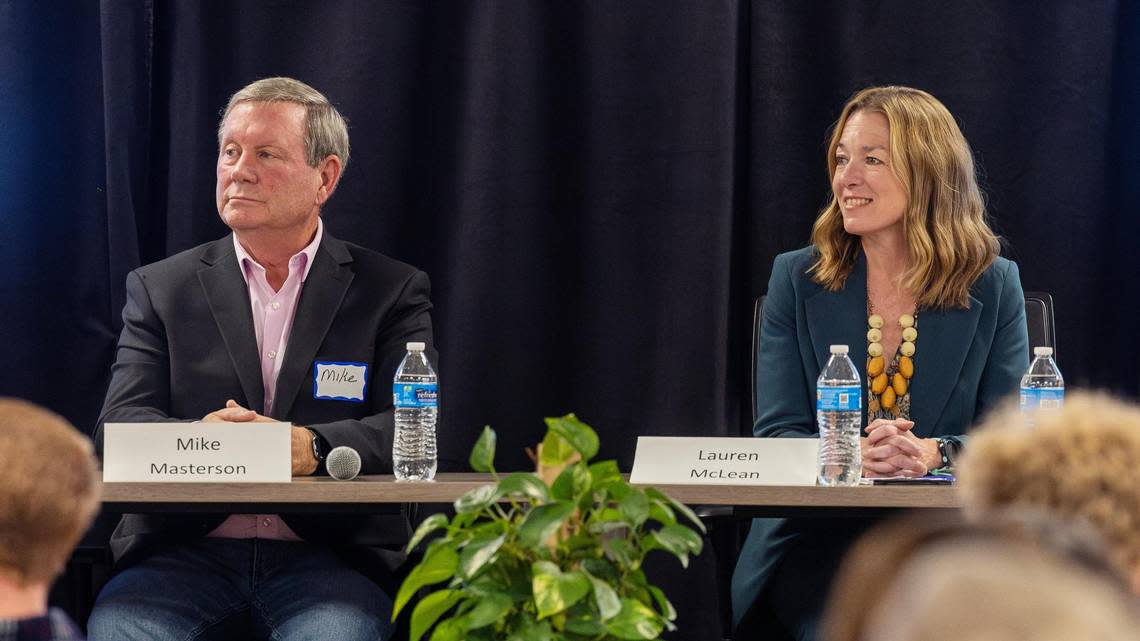
McLean leads Masterson in funds by more than $220,000
Many of the issues at play in this year’s election hearken back to those that were relevant in 2019, when McLean, then president of the City Council, challenged Bieter, the longtime mayor.
Many established leaders in the city — like former City Council members Elaine Clegg and Holli Woodings — supported Bieter in that race. In the four years since, some alliances have changed with a new face in the mayor’s office.
“I was really impressed with her ability to set aside whatever hard feelings there were and say: ‘Yes, I want to work on what’s important for the city. Because that’s why I’m here,’ ” Clegg told the Statesman. That led Clegg, now the CEO of Valley Regional Transit, to endorse McLean. So did Woodings, who left her position as council president this summer and moved to Washington, D.C.
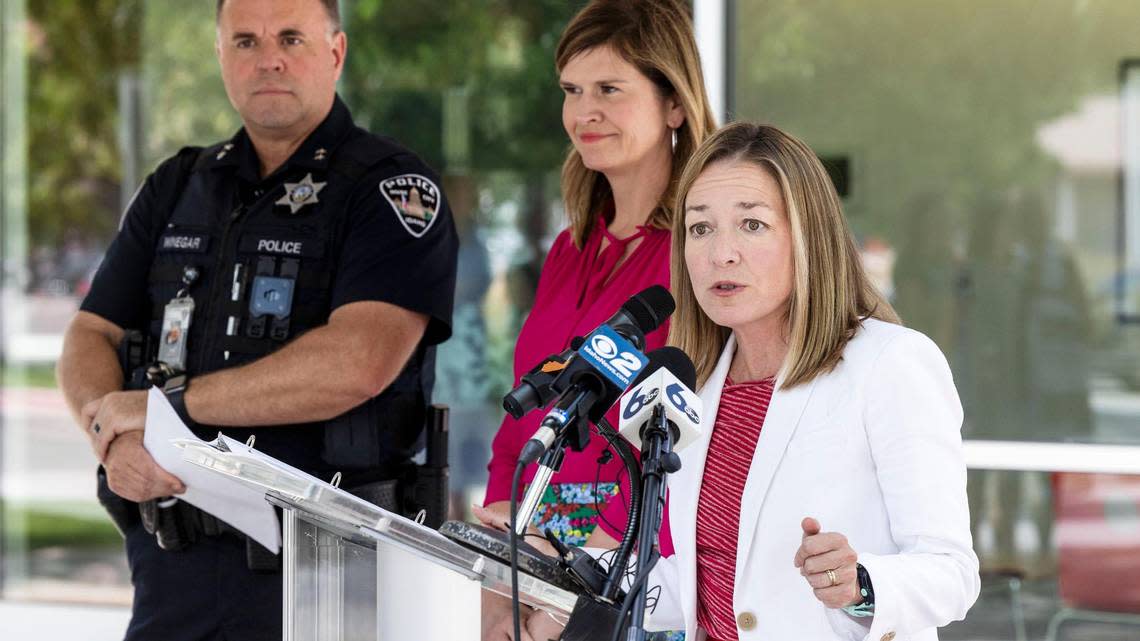
McLean lives in the North End with her husband, Scott, and has two college-aged children. She moved to Boise after college more than 20 years ago, earned a master’s degree in environmental policy at Boise State before leading a campaign to protect parts of the Boise Foothills from development, and won an appointment to the Parks Commission and the Planning and Zoning Commission. In 2011, Bieter appointed her to the City Council. She was elected twice and became council president in 2017.
McLean is a trail runner who often bikes to work, though she was hampered for several months by a serious knee injury sustained while skiing earlier this year that required surgery. “I would definitely not recommend an extensive knee injury in an election year,” she said in an interview.
The mayor has built a powerful fundraising machine, pulling in nearly $500,000 so far this election cycle, compared with the $355,000 she raised in the 2019 race.
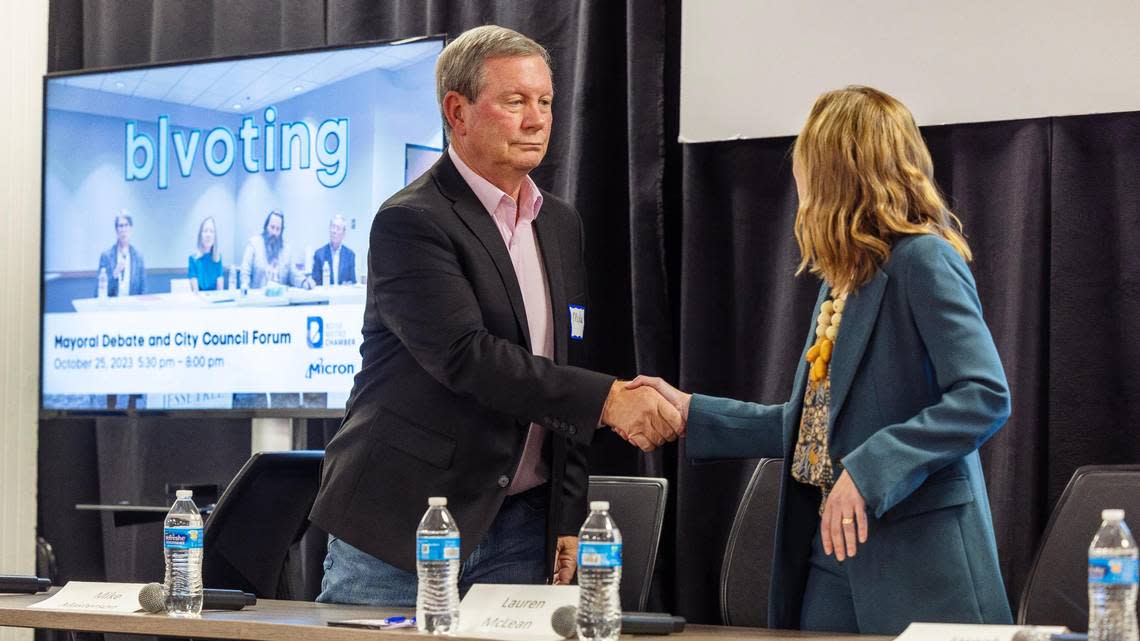
Her campaign is run by Melanie Folwell, who directs a consulting firm called The Scrap Shop that is also working for the City Council campaigns of Colin Nash, Meredith Stead, Jordan Morales and Jimmy Hallyburton, who has already won his seat.
She has the support of several local trade unions, Planned Parenthood, Democratic leaders in the Legislature, three sitting Ada County Highway District commissioners and former Democratic U.S. Rep. Larry LaRocco.
Outside groups have spent heavily in her campaign, including a political action committee called Boise Fact Check, which has raised more than $300,000 and been running television and social media ads in favor of McLean. Its board members include LaRocco, Bittercreek Alehouse owner Dave Krick, local developer Casey Lynch and land-use attorney Geoffrey Wardle. Washington, D.C.-based Open Democracy PAC gave the PAC $50,000, and the Conservation Voters for Idaho Action Fund has paid to produce Fact Check’s ads and reported them as over $200,000 in in-kind donations.
In adopting the journalistic language of “fact checking” for political purposes, the Fact Check PAC has come under fire from Masterson’s campaign for cherry picking information to the benefit of McLean.
BoiseDev reported the PAC has misconstrued aspects of McLean’s tenure, including claiming that she has annexed land for housing that she was not directly involved in. PACs are allowed to spend unlimited amounts on races so long as they don’t coordinate with candidates.
Masterson’s campaign treasurer, longtime Democratic legislator and City Council member Maryanne Jordan, said in a statement that the PAC’s methods are an “outrage.”
Masterson has raised more than $280,000 and is backed by a coalition of leaders upset with the mayor’s policies. He’s received the prominent support of the city’s police and fire department unions, and his campaign headquarters is the fire union’s office. He also has the support of Bieter, former Republican City Council member Alan Shealy, and former Republican Attorney General David Leroy.
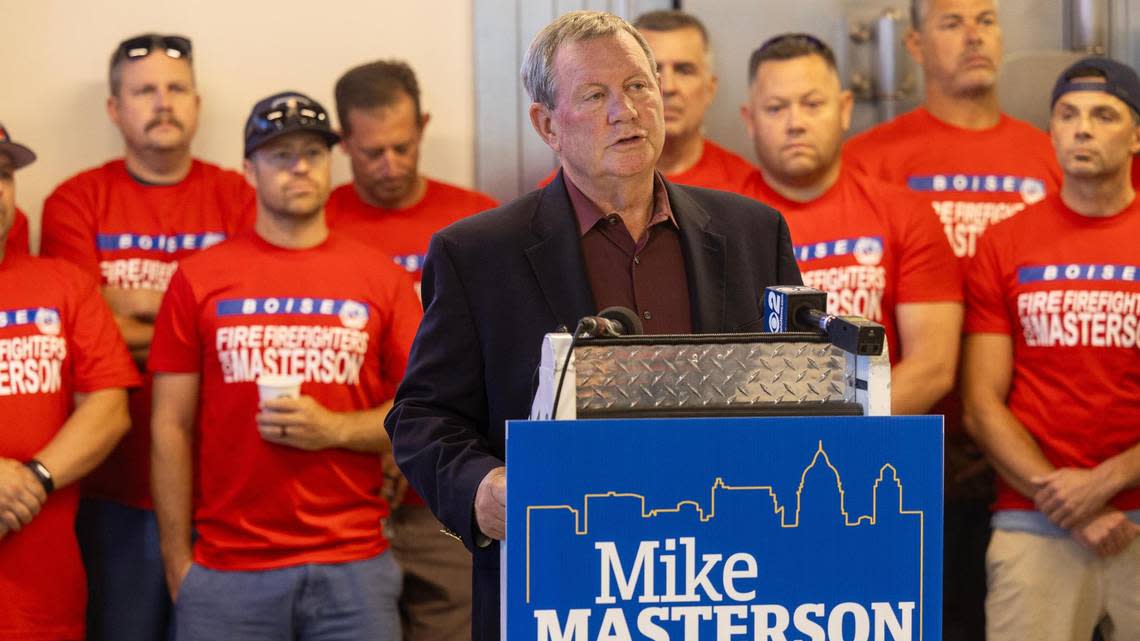
Masterson came to Boise from Madison, Wisconsin, in 2005 to run the Police Department. Since retiring in 2015, he has volunteered with veterans organizations. He lives with his wife, Vicki, in West Boise.
Jordan, who is also a former member of the Statesman’s editorial board, said in an interview that she was retired and had not envisioned herself getting involved in another campaign. “We have some huge concerns with the record of this administration,” she said.
Two other candidates — Joseph Evans and Aaron Reis — are also in the race, though neither has raised more than $500, the minimum reporting threshold. Both candidates said they have experienced homelessness recently. Reis, who identifies as gender neutral, does not really want to be mayor, they have said.
Mayor’s race has ‘an underlying ideological tone’
Though local elections in Idaho aren’t partisan, they often have a partisan tilt, and Lyons told the Statesman that this year’s race has an “underlying ideological tone.”
McLean, a Democrat, has been running in part on social issues, including footage of herself at the Boise Pride festival and emphasizing her efforts to de-prioritize enforcing the state’s stringent abortion laws in Boise.
”I would like nothing more than for mayors and city councils around this country to not have to wade into these issues,” McLean said about abortion at a debate this month hosted by the City Club of Boise. “But when we have a state that says they will criminalize our doctors, criminalize our daughters, maybe even us if we have problems with our pregnancy, I’m going to be clear that there is a place for everyone here, and we will not prioritize resources to help with those investigations.”
Masterson, a former Republican who describes himself as an “independent centrist,” has countered that abortion is not an issue that is the responsibility of cities to address, adding that women are “not safe when politics becomes involved in medicine.” Though he said he went to Pride this year with his family, he did so “quietly,” and his campaign didn’t have a presence there.
“I’ve lived my values when it comes to treating people with respect,” Masterson said in an interview, noting that he has long supported a campaign to add protection for LGBTQ+ residents to the state’s human rights law.
“I just didn’t use it as an opportunity to film a political campaign commercial,” he said.
Masterson has returned one donation from a previous College of Western Idaho trustee candidate who made anti-gay posts online. He has also disavowed support from a PAC that ran Facebook ads condemning McLean’s “far-left agenda” in reference to her support for gay rights. The PAC, Building Industry Group PAC, has made several ads supporting Masterson while taking aim at taxes, spending and McLean’s views on social issues and homelessness.
“Mike is a good person, everyone knows that,” Jordan said. “It’s been a little sad to see the effort to tie him to extremists when it’s just not true.”
Lyons said Masterson’s effort to win by appealing to centrist voters is a tall task that will require attracting the support of Republicans as well as a slice of Boise’s Democratic majority. In 2020, Joe Biden won most precincts in the city handily, with the strongest Republican support in West Boise. In 2019, McLean beat Bieter by two-thirds margins in precincts in Northwest Boise, the Bench, the North End and West Boise south of Chinden Boulevard.
“He knows he’s not going to win on a conservative platform in Boise,” Lyons said. “So he needs to get those conservative voters but he also needs to then peel off the more centrist voters that are there. So he’s got to walk that fine line.”
Lyons said he thought Masterson’s emphasis on city spending and property taxes is aimed at attracting conservative support.
But in a hyperpartisan time, Lyons said, voters often don’t believe that anyone is a centrist.
“I’m not saying this is Masterson, but what most folks are assuming is that everybody is a hyperpartisan, they’re just trying to hide it,” Lyons said.
He added that winning will be an “uphill” battle for Masterson, as the town is a Democratic stronghold and he senses a large number of Boiseans feel “upbeat” about the city’s overall trajectory.
McLean’s emphasis on abortion may be about signaling her values to voters and activating a progressive base in a nonpartisan race that involves complex issues some residents don’t know much about, Lyons said. The Boise Fact Check PAC has also been running television commercials emphasizing McLean’s support for abortion rights.
“Maybe you don’t understand the nuances of affordable housing issues, but here’s something you do get,” Lyons said. “This is telling you something about me and this is telling you something about my opponent.”
The messaging comes as Democratic candidates have won in special elections around the country this year, signaling to some analysts the unpopularity of the Republican stance on abortion after the overturning of Roe v. Wade last year, which previously guaranteed some abortion rights.
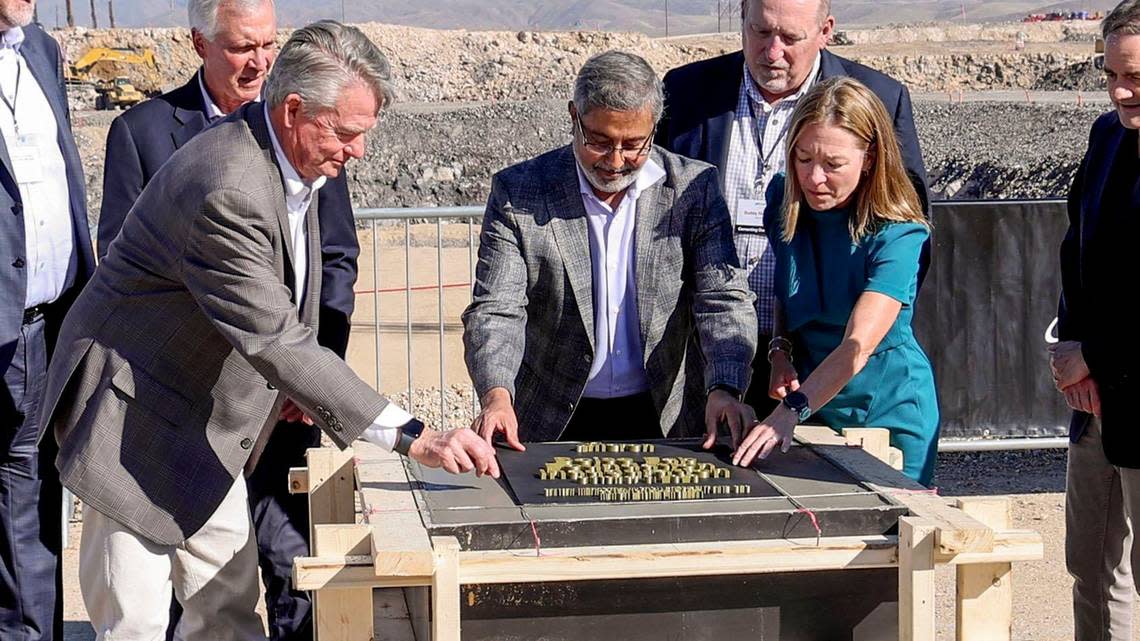
Lyons said Masterson’s de-emphasis of abortion is a pragmatic strategy for a more conservative candidate.
“He would prefer it if the race didn’t come down to a discussion about this particular issue,” he said.
‘Housing, housing, housing’
In June, the Boise City Council unanimously passed a new zoning ordinance, completing the years-long process of overhauling the city’s rules for building and development, which rewrote city laws dating to the 1960s. The new rules allow for more density along transit corridors and with limits in neighborhoods, as part of an effort to build more homes in a market now beset by scarcity.
The changes are one of a number of shifts in Boise related to housing that the mayor has pushed through City Hall.
A city housing study in 2021 found that Boise needs 2,770 new housing units per year to meet demand, with nearly 80% of those homes affordable for people making 80% or less of the area median income, which is $57,050 for a two-person household, according to city statistics.
McLean has advertised helping to “foster” 1,200 affordable homes during her tenure, which are either built or in development. She has also passed new protections for renters into law, secured ordinances aimed at incentivizing developers to build affordable housing, and used city-owned land to partner with developers on apartment projects.
For 2020 and 2021, the first two years McLean was in office, rents in Boise increased by 36%, before declining by less than 1% in 2022, according to previous Statesman reporting. Those rises coincided with some population shifts around the U.S. that were accelerated by the pandemic.
Between 2017 and 2021, median home sale prices rose by 72% in Boise, before falling by more than a seventh this year.
That’s kept housing top of mind for many residents.
“The highest priority that I’m hearing on doors again, that my volunteers are hearing, that I’m hearing, is housing, housing, housing,” McLean told the Statesman in an interview.
Masterson has attempted to challenge McLean on the issue, invoking Harris Ranch and Bown Crossing as models to pitch a plan to annex land farther out in Southeast Boise to build affordable housing. He has also said he supports rewriting the zoning code but doesn’t think neighborhoods had enough input on new rules that will limit public notification about development.
He told the Statesman the city needs thousands of affordable homes, not hundreds.
“There’s no doubt it takes time,” he said, “but the clock has been ticking for three years and we haven’t done anything.”
At the same time, Masterson said at the City Club debate that he wanted to cut public funding for affordable housing and instead rely on the private sector. He later walked back those comments, saying he supports city involvement and wants to build more partnerships.
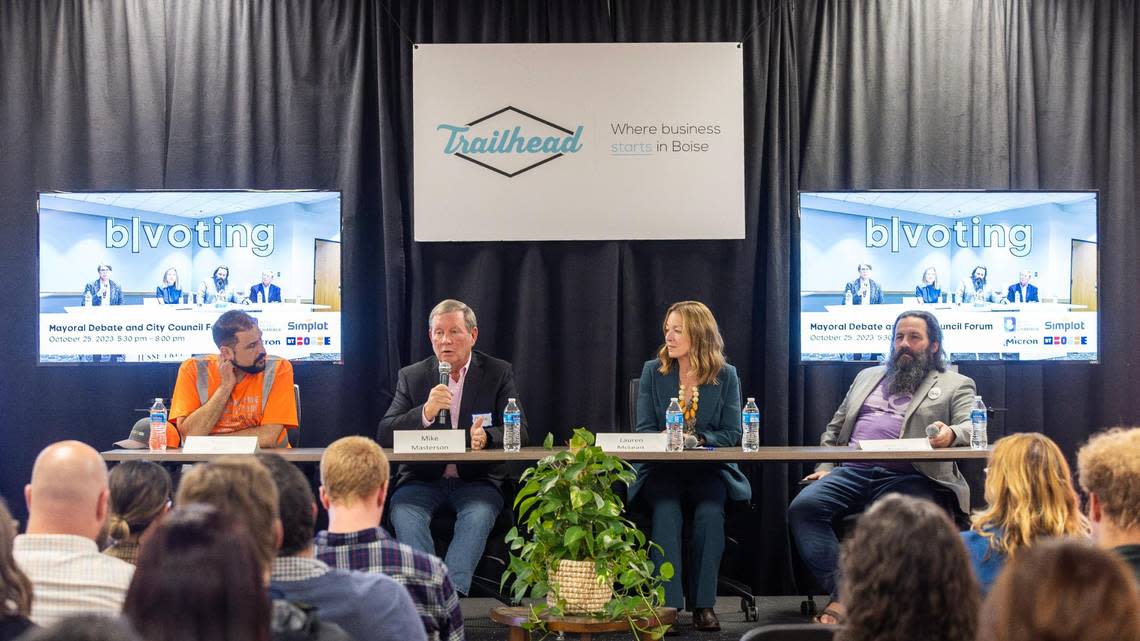
A number of Masterson’s proposals appear similar to initiatives McLean has already instituted, like partnerships with developers and an expanded land-trust program.
Though McLean told the Statesman she is open to annexing new land where feasible, Masterson’s proposal to annex land for affordable housing has been met with skepticism by some longtime Boise leaders.
Instead of putting affordable homes in one place, McLean said, she aims to use partnerships and incentives “to make it possible for affordably built homes to be where folks want to live, close to jobs, rather than in the desert next to highway interchanges.”
Clegg, who was on the City Council for 20 years, said building new developments accompanied by new sewer lines, water mains and other infrastructure is more expensive than adding density in existing neighborhoods. Sprawling growth also provides less tax revenue and is less suited for public transit, she said.
“There’s a lot of cost-of-service studies that show that single-family residential very rarely supports all the costs that it incurs on a jurisdiction,” Clegg said. She added that it has taken nearly a generation for development at Harris Ranch to progress from standalone homes to apartment-style housing — time the city and its residents no longer have.
She said many major corridors in Boise are full of strip malls that could readily be replaced with apartment buildings.
“There’s a lot of fear that there’s going to be a lot of change internal to neighborhoods,” Clegg said. “I think that fear is unfounded.”
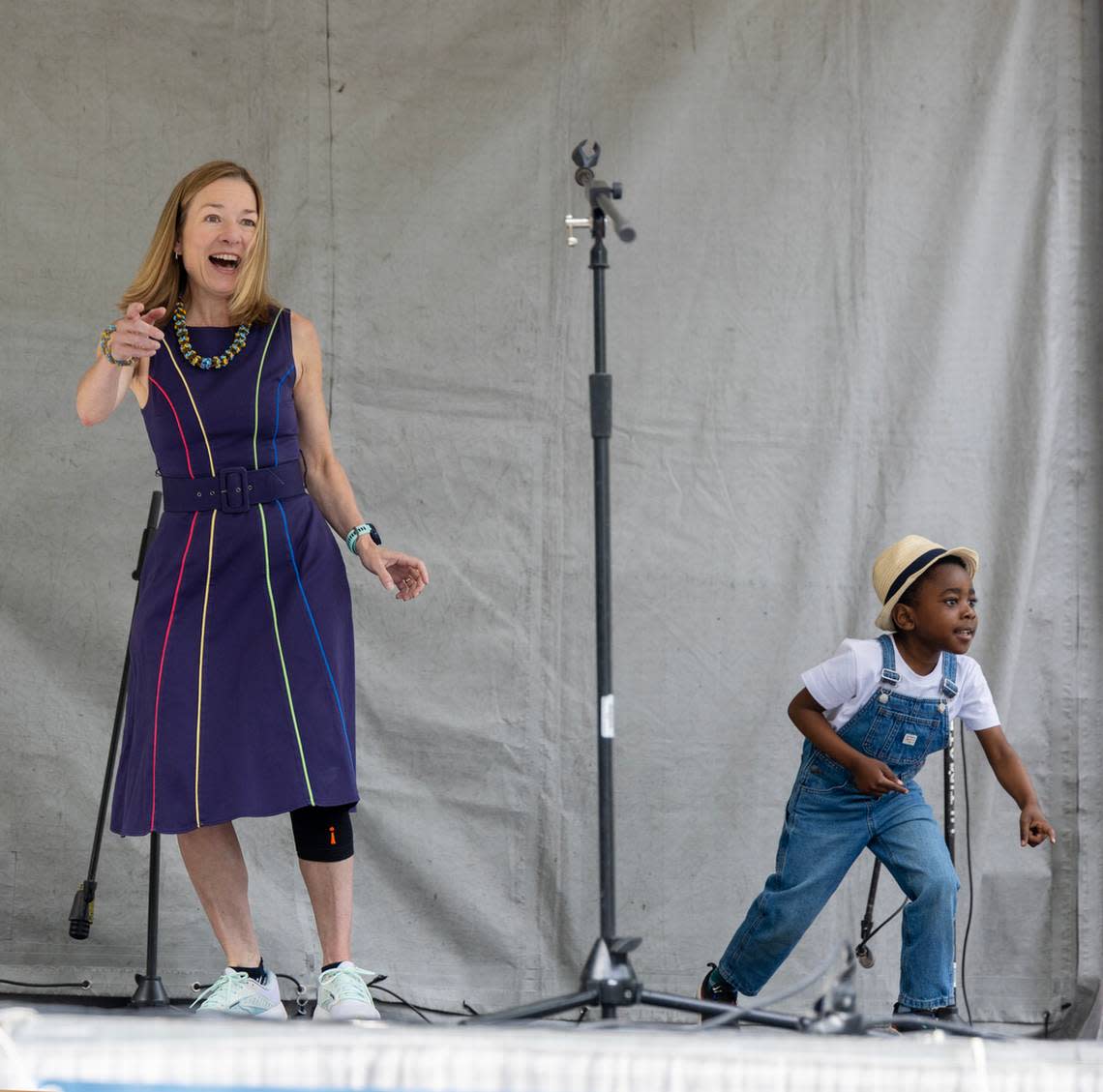
Masterson questions McLean’s police leadership amid lawsuits
While in office, McLean has drawn significant criticism for her management of the Police Department.
Masterson has also focused on what he calls “perceptions” of crime at debates. Police Department data shows crime rates are at 20-year lows.
“It’s not just about hard numbers,” he said at a debate at Cathedral of the Rockies hosted by neighborhood associations on Oct. 19. “It’s about those soft feelings as well.”
He added, “I came out of this retirement because I see a city in controversy and chaos.”
Two years after hiring a chief from the Portland Police Bureau in 2020, McLean fired Ryan Lee because, she said, he had lost the trust of officers. Lee had been accused of hurting an officer’s neck, which resulted in a settlement and a recent lawsuit by the officer, as well as a countersuit from Lee accusing the officer of deliberately derailing his career by making false statements.
The neck incident was followed by complaints about Lee’s leadership, which an independent law firm later tied to reforms he was making in the department.
A retired police captain sued the city in 2022 for discrimination and retaliation. The mayor’s office launched a half-million-dollar investigation into possible racism at the Police Department, which identified policy problems. The investigation was cut short before the chosen Washington, D.C. attorney said it was complete, and it exceeded the initial budget.
McLean and the City Council also fired the Police Department’s oversight director, Jesus Jara, in December, accusing him of watching police footage without authorization. He has denied that claim and sued.
Two months after he was fired, the two investigators in the oversight office resigned.
“The Police Department as an overarching thing is an issue,” Witt, the Boise State professor, said. “It looks like there’s a problem, and there’s a problem in managing the problem.”
Masterson has pointed out that several officers have left the department to work at other nearby law enforcement agencies, and said the mayor’s leadership has left it in “crisis.”
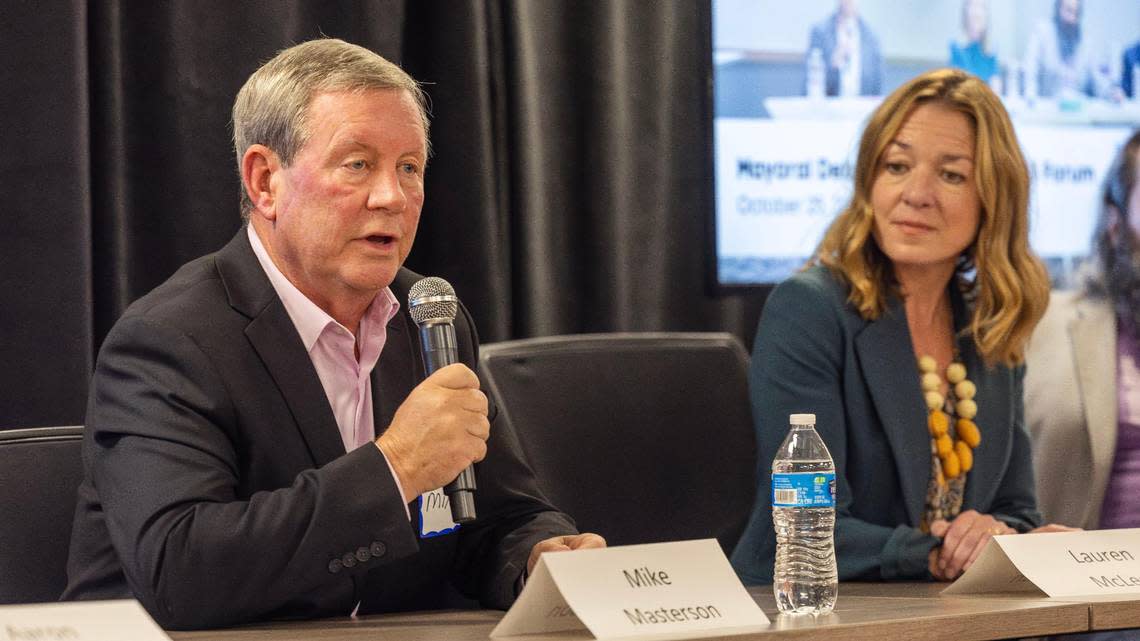
McLean has said that Lee’s tenure “didn’t work out,” while noting that she has authorized 34 new police positions — which is about the number of vacancies the department has now — and which she said exceeds the hiring plan under Bieter by 70%.
She has also pointed to new contracts with the police and fire unions that provide double-digit raises, and noted that police hires are up 50% from 2020 and retirements, resignations and discharges are down by a third.
“We have made intentional investments in safety, justice and accountability,” she said at the City Club debate.
How voters feel about safety, housing prices and the city’s approach to the environment and social issues like abortion could all affect what voters decide on Election Day.
Witt said Masterson has raised a lot of money in a short time, but McLean has a “significant advantage.”
“But you don’t win because you raise more money, you win because you persuade more voters, right?” she said.
How much does Boise pay city employees? Search our 2023 salary database
Fired police overseer wants Boise mayor’s testimony. City lawyers resist. What they say
Labrador quit Boise-area health board. New nominee has disputed views on vaccines, Covid
Exclusive: What new data shows about impact of new Boise-area apartments on crime
